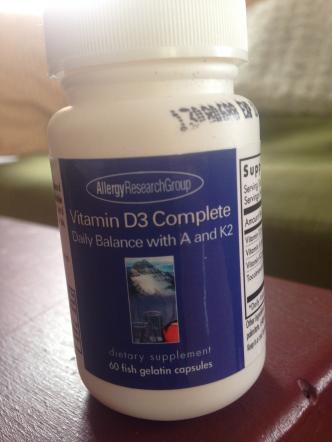It's winter. And in the Midwest, it's been kinda rough, with 42 days of below-zero temperatures and plenty of snow. If weathering the cold and gray is making you glum, here are seven ideas for boosting your mood and your energy so the next couple months don't feel so heavy.
Fortify yourself with vitamin D-3, the "sunshine vitamin." Low blood levels of vitamin D are linked to depression, as well as obesity, diabetes, heart disease, autoimmune disease, osteoporosis, and cancer. This fat-soluble vitamin is the only vitamin that can be generated by the body in a super cool chain-reaction that is catalyzed when our skin is exposed to sunlight, specifically UV-B rays.
 Vitamin D for the winSadly, after about September, UV-B rays do not penetrate the atmosphere north of Atlanta, GA, and don't return until April-ish. So, even if you were crazy enough to step out into the subzero temperatures with your skin exposed in the dead of winter, you would gain no benefit (besides badass cred).
Vitamin D for the winSadly, after about September, UV-B rays do not penetrate the atmosphere north of Atlanta, GA, and don't return until April-ish. So, even if you were crazy enough to step out into the subzero temperatures with your skin exposed in the dead of winter, you would gain no benefit (besides badass cred).
Other sad news on the vitamin D front: there are only a few sources of the sunshine vitamin in food and it's present in only small, sub-therapeutic amounts: grass-fed beef and whole-fat dairy, pasture-raised egg yolks, and fatty fish (salmon, tuna, and mackerel) and fish liver. Mushrooms exposed to UV rays contain some D, but in a form that is not readily used by the body (D-2).
So, what's a Midwesterner to do? I recommend supplementing with D-3. The standard recommendation is 400 IUs per day, but experts like Dr. Andrew Weil recommend up to 2,000 IUs per day. My thought is that if you are fighting seasonal affective disorder (SAD) or depression, start by getting your vitamin D levels checked by your physician. If you are deficient — like 25 percent of the U.S. population — start on a higher dosage until you get your blood levels up, then taper off to a sustainable level.
 Become a fermentation ninjaFeed the bugs in your gut. Awe-inspiring research has exposed the integral relationship between the gut and mood. As it happens, the bacteria in our gut stimulate the production of serotonin and 'tickle' the vagus nerve in our bellies to transmit information to the brain. When there is a thriving ecosystem of microorganisms in the gut, the blues are a color of the past. There are several ways to integrate probiotics into your daily diet:
Become a fermentation ninjaFeed the bugs in your gut. Awe-inspiring research has exposed the integral relationship between the gut and mood. As it happens, the bacteria in our gut stimulate the production of serotonin and 'tickle' the vagus nerve in our bellies to transmit information to the brain. When there is a thriving ecosystem of microorganisms in the gut, the blues are a color of the past. There are several ways to integrate probiotics into your daily diet:
- Eat fermented foods: yogurt, raw sauerkraut, kimchi, or other fermented veggies.
- Drink ferments: dairy, water, or coconut kefir, kombucha, or kvass.
- Take a probiotic supplement: Shop around for a probiotic with 6 or more different strains of bacteria and 20 billion CFUs (or more).
Move your body. Physical activity is a simple way to boost your energy and your mood. Spending 30 minutes a day, three to five days a week exercising to stimulate the production and release of endorphins, our feel-good brain chemicals. This is also a sure-fired way to stimulate and support your immune system. Added bonus: working out turns up your body temperature. Hey, it's cold outside! Doesn't that sound nice?
Get your social on. The polls are in: you're happier the more you socialize. Americans report that they are happier when they spend six to seven hours a day in the company of others. Did a gasp just escape your introverted lips? Keep in mind that interacting in the work place counts, and very well may satisfy your social needs. But tuck this tidbit into your hermit hat. When your home starts to feel like a cage, and when hunkering down for another cold night is not rejuvenating anymore, get out there and socialize!
 Go on…it's not as bad as you thinkSpend time outside. I know what you're thinking. "Who's this crazy lady telling me to go outside in the middle of winter? Doesn't she know it's freezing out there?!" Yes, yes I do. When I suffered from seasonal affective disorder (SAD), I changed my lifestyle so that I was spending time outside every day. It made a world of difference. Not only was I out, moving my body (mostly walking or biking), but I was also experiencing the season in a new way. Instead of racing from outdoors to indoors, I found a way to appreciate winter for what it was. Nowadays, I don't really mind the cold or the gray.
Go on…it's not as bad as you thinkSpend time outside. I know what you're thinking. "Who's this crazy lady telling me to go outside in the middle of winter? Doesn't she know it's freezing out there?!" Yes, yes I do. When I suffered from seasonal affective disorder (SAD), I changed my lifestyle so that I was spending time outside every day. It made a world of difference. Not only was I out, moving my body (mostly walking or biking), but I was also experiencing the season in a new way. Instead of racing from outdoors to indoors, I found a way to appreciate winter for what it was. Nowadays, I don't really mind the cold or the gray.
Get some rays. Another sneaky benefit of spending time outside every day is that the sun is very therapeutic. So, when it shines its beautiful face on us, a couple super cool things happen.
- Sunshine acts as a pacemaker for our circadian rhythm, the wake and rest cycle, by decreasing our stress hormones (cortisol) and increasing our rest hormone (melatonin).
- Sunshine regulates our mood-regulating neurotransmitters, serotonin and dopamine.
- Those beautiful golden rays bring us pure, unadulterated joy. Win win!
By now you may have realized a hitch in this information. There are parts of the world (ahem, Minnesota) that have very short days in the winter, and even when the days lengthen, the sun frequently does not grace us with her presence.
This is where light therapy enters the scene. Our brilliant engineers have created UV and full-spectrum light bulbs that mimic the sun and provide the same benefits for the beholder. They fit in a large assortment of light fixtures and are also available in specially crafted light therapy boxes. If you suffer from SAD or seasonal insomnia, light therapy is a risk-free, low-cost option I encourage you to explore.
 Master the art of loungingGo to bed early and get plenty of rest. How much is plenty? Probably more than you think you need, and more than you get the other three seasons of the year. Keep in mind that our ancestors rose and retired with the sun, and our bodies are programmed to do the same. It may be unrealistic for you to go to bed at 4:00 pm, but start winding down as early as possible. Shut down electronics and lower the lights in your home when you sit down to dinner. Don't make too many plans for yourself after 8:00 pm, so you have time to unwind, get cozy, and tuck into bed by 10:00. If going to bed at that time sounds just way too crazy, consider this: getting an extra 60 to 90 minutes of sleep each night would make most of us happier, healthier, and safer.
Master the art of loungingGo to bed early and get plenty of rest. How much is plenty? Probably more than you think you need, and more than you get the other three seasons of the year. Keep in mind that our ancestors rose and retired with the sun, and our bodies are programmed to do the same. It may be unrealistic for you to go to bed at 4:00 pm, but start winding down as early as possible. Shut down electronics and lower the lights in your home when you sit down to dinner. Don't make too many plans for yourself after 8:00 pm, so you have time to unwind, get cozy, and tuck into bed by 10:00. If going to bed at that time sounds just way too crazy, consider this: getting an extra 60 to 90 minutes of sleep each night would make most of us happier, healthier, and safer.
Beat back the winter blues, my friends! You've now got the tools to even enjoy it a little bit. Maybe.
 Jesse Haas is Co-Founder of Chakra Khan, where she is a Massage Therapist and Health Coach. Her approach to working with clients integrates whole body health and conscious eating. To learn more about her practice or to schedule a free consultation, visit www.jessehaas.com or email her at jesse@jessehaas.com.
Jesse Haas is Co-Founder of Chakra Khan, where she is a Massage Therapist and Health Coach. Her approach to working with clients integrates whole body health and conscious eating. To learn more about her practice or to schedule a free consultation, visit www.jessehaas.com or email her at jesse@jessehaas.com.
